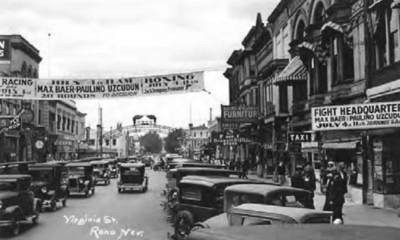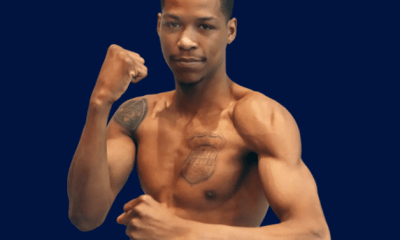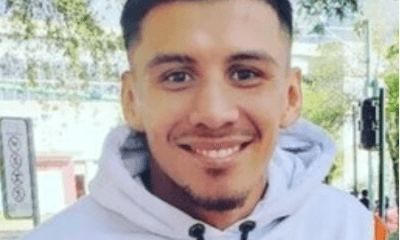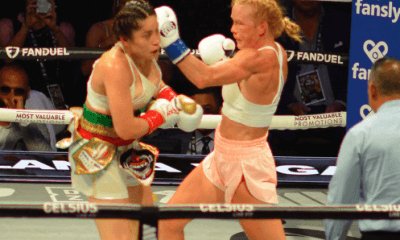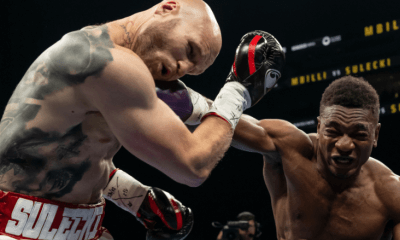Featured Articles
Arne’s Almanac: More Chaos for Ryan Garcia and a Note on Don King’s Impotent ‘Whip’

Arne’s Almanac: More Chaos for Ryan Garcia and a Note on Don King’s Impotent ‘Whip’
The Waldorf Astoria Beverly Hills Hotel is the flip side of a Motel 6. For the fun of it, we went to the hotel’s website and checked the rates for this coming weekend. For a party of two, the cheapest room has a base rate of $1248 per night. That’s before taxes. With taxes, the tab swells to $3,016 for a two-night stay on Friday and Saturday.
In a classy joint like this, one surmises that it would be fairly easy to rack up a $15,000 bill for incidentals if one got too frisky and broke a few things. Ryan Garcia would know.
On Saturday afternoon, June 8, Garcia was removed from the hotel in police handcuffs and subsequently charged with felony vandalism according to TMZ. By California law, any vandalism above $400 qualifies as a felony. Reports say Garcia trashed his room and a hallway to the tune of $15,000.
The boxer had been staying at the Waldorf Astoria since at least Wednesday when family members requested a welfare check, believing that he may be in some kind of distress. It isn’t known at this time if he shared the room with anyone. Reports say that he appeared to be under the influence of alcohol or drugs as he was being led away from the property wearing what appeared to be a motorcycle helmet.
Garcia had been acting erratically even before he upset previously undefeated Devin Haney on April 20 at Barclays Center in Brooklyn. His wonderful performance was tarnished by the fact that he came in overweight and was thus ineligible to strip Haney of his WBC world super lightweight title belt, and his reputation was sullied to a far greater extent when it came out that he had tested positive for a banned PED.
Since that memorable night in Brooklyn, Garcia has come to learn that his mother has breast cancer. This has apparently caused him considerable worry. “Ryan has been open about his struggles with mental health over the years, and at this time he is dealing with an immense emotional burden,” said Garcia’s attorney Darin Chavez. “The support and understanding from fans and the public are crucial as he navigates these personal challenges.”
By all accounts, Ryan Garcia, who turns 26 in August, has the largest social media following of any boxer in the English-speaking world. He is said to have 12 million followers on Instagram. While he was at the hotel, Garcia used his platform to assert that he hadn’t been paid all the money that was owed to him from the Haney fight. “Me too,” chimed in Devin Haney, which prompted this formal statement from Garcia’s promoter Golden Boy, the lead promoter of the April 30 event: “As we have always done with all our fighters, Golden Boy paid Ryan and Devin exactly what they are owed under their contracts. As with all PPV events, revenue comes in over time and additional payments will be made when more money is received. If they aren’t aware of this fact, we would hope that their managers are. Or perhaps Ryan and Devin should pay more attention to their contracts than their social media feeds.”
—
“The Whip”
Back in the days when the foremost boxing arena in the world was in the basement of London’s posh National Sporting Club – we’re going all the way back to the 1890s – the man whose unofficial job title was that of a whip was a key component of the operation. It was the whip’s responsibility to see that the show went on without awkward delays in the action. He lorded over the dressing room, making certain that each boxer was ready to go the moment he was summoned to the ring. It was important for the satisfaction of the patrons to maintain a seamless pace.
Boxing promoters still depend on whips today, although the name is no longer used. But if Don King employed a whip for his last show, the fellow certainly didn’t curry much sway with the talent. There were interminable delays leading up to the main event between Blair Cobbs and Adrien Broner, long recesses filled with idle chatter between panelists Tre’Sean Wiggins and Albert Haynesworth. Wiggins is a welterweight boxer who presumably has some sort of personal services contract with Don King. He was initially slated to fight on this card and when that fight fell out, he was shifted over to the broadcasting department. Haynesworth is a former all-pro NFL defensive tackle. Don’t look for him to replace Michael Strahan on those NFL telecasts anytime soon.
These unscheduled intermissions were not entirely unexpected. Adrien Broner showed up late at the press conference two days earlier where he added some sauce to the most cringe-worthy boxing press conference ever, quite an achievement considering that the bar had been set so high. Broner turned pro with the firm expectation that he would eventually surpass Floyd Mayweather Jr. in career earnings. He emulates Floyd in one regard; he moves through the world on Mayweather Time.
The most bizarre moment in this five-fight Friday Night telecast (a $40 pay-pre-view) came when the ring announcer, at the behest of King, asked the crowd to stand in solemn remembrance of Jose Sulaiman while the timekeeper hit the gong 10 times. The 10-bell memorial is a nice tradition in boxing, but Sulaiman, the former president of the World Boxing Council, passed away on Jan.16, 2014. Egads, the man’s been dead for 10 years.
The 10-round welterweight contest between Cobbs and Broner was for the “People’s Championship.” For the record, Cobbs won a unanimous decision. Scoring at home, I gave Broner one round.
To comment on this story in the Fight Forum CLICK HERE
—
Arne K. Lang is editor-in-chief of The Sweet Science. He is the author of five books including “Prizefighting: An American History” released by McFarland in 2008 and re-released in a paperback edition in 2020.
-

 Featured Articles3 weeks ago
Featured Articles3 weeks agoAvila Perspective, Chap. 330: Matchroom in New York plus the Latest on Canelo-Crawford
-

 Featured Articles2 weeks ago
Featured Articles2 weeks agoVito Mielnicki Jr Whitewashes Kamil Gardzielik Before the Home Folks in Newark
-

 Featured Articles4 weeks ago
Featured Articles4 weeks agoAvila Perspective, Chap 329: Pacquiao is Back, Fabio in England and More
-

 Featured Articles4 weeks ago
Featured Articles4 weeks agoOpetaia and Nakatani Crush Overmatched Foes, Capping Off a Wild Boxing Weekend
-

 Featured Articles3 weeks ago
Featured Articles3 weeks agoCatching Up with Clay Moyle Who Talks About His Massive Collection of Boxing Books
-

 Featured Articles4 weeks ago
Featured Articles4 weeks agoFabio Wardley Comes from Behind to KO Justis Huni
-

 Featured Articles2 weeks ago
Featured Articles2 weeks agoMore Medals for Hawaii’s Patricio Family at the USA Boxing Summer Festival
-

 Featured Articles4 weeks ago
Featured Articles4 weeks agoDelving into ‘Hoopla’ with Notes on Books by George Plimpton and Joyce Carol Oates

